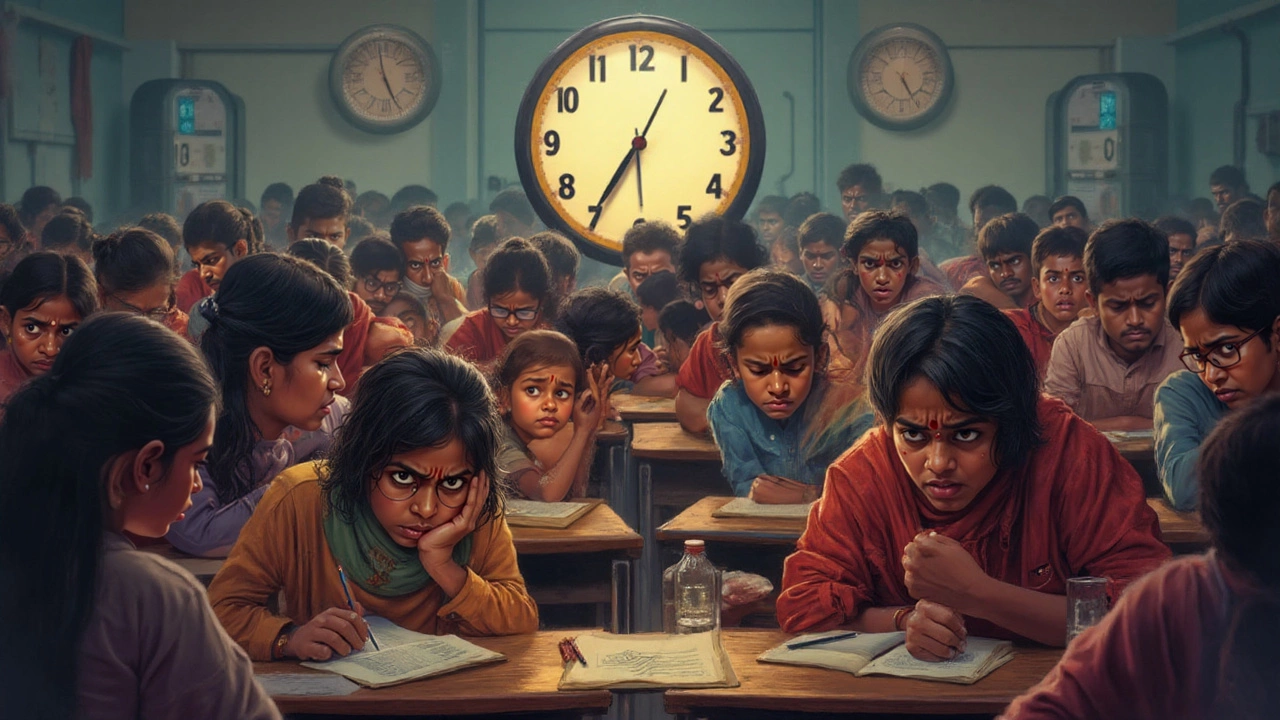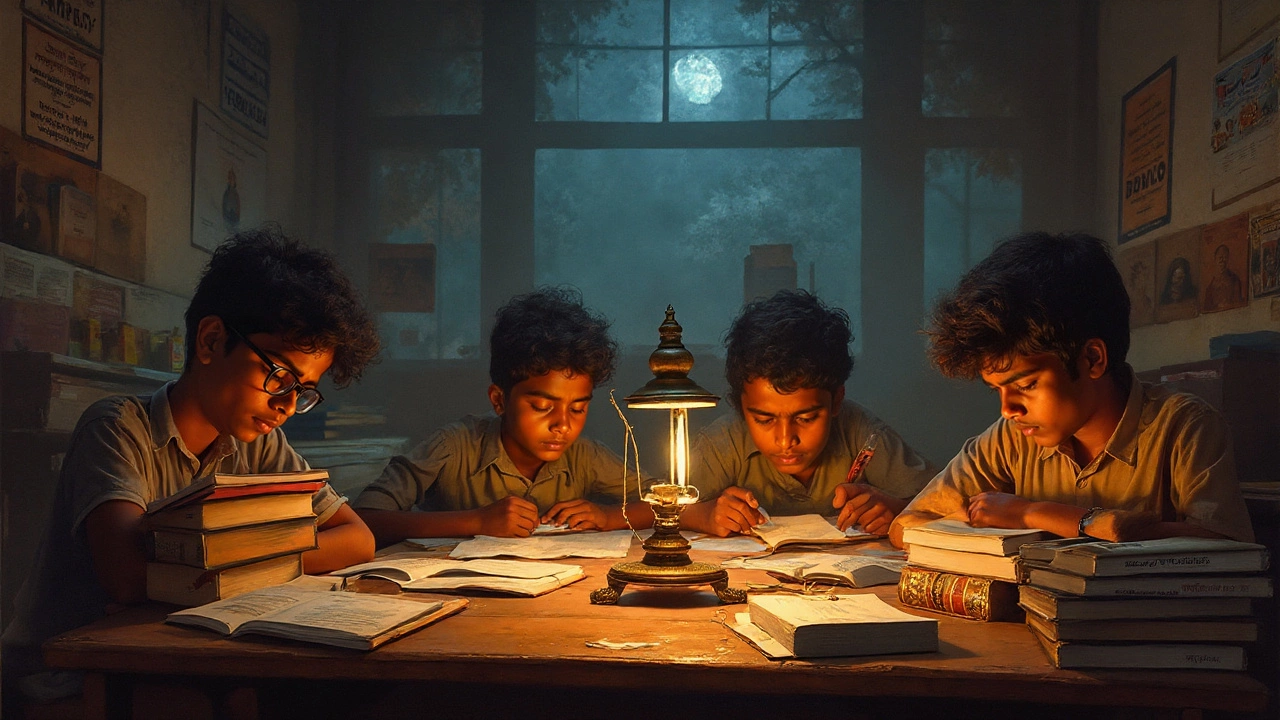You won’t believe how far people go to pass some exams. We’re talking ten-hour days, reading until your eyes blur, and even spending whole years just chained to a desk. But which exams actually have the power to break even the best-prepared candidates? If you ever thought finals week was tough, wait until you meet the monsters on this list. These tests chew up thousands of hopefuls every year—some quit, some break down, while a lucky few crawl out victorious. Pull up a chair and let’s peek inside the world’s three toughest exams.
The Gaokao: Fear and Glory in China’s National College Entrance
Panic attacks before breakfast. Parents camping outside schools for days. It sounds like a movie, but it’s normal life every June in China, thanks to the Gaokao. Officially called the National College Entrance Examination, the Gaokao is a rite of passage for about 12 million Chinese teenagers every year. It determines who gets into which university, what you’ll study, and, for many, your entire adult life.
The sheer scale is staggering. On the main test days, traffic grinds to a halt as whole cities pause so students can arrive on time. Factories muffle loud noises. In some provinces, it's over 9 hours of relentless testing, spread over multiple days. The pressure is legendary. Students start hardcore prep in middle school. For many families, the kid’s entire social life gets put on pause, so they can squeeze out every point possible.
Why so tough? For one, the questions are terrifyingly complex. The language part might ask you to analyze ancient poems; the math problems confound even adult engineers. Most students have nightmares about their essays, because only those with the sharpest logic and creativity can tackle what the nationwide graders are looking for. If you miss the cut, you’re often forced to repeat the entire year, or settle for a lesser school you never dreamed of attending.
Let’s lay out a couple of hard facts. In 2024, the top Peking University only admitted around 0.05% of Gaokao applicants. On the flip side, the bottom quarter of scorers usually don’t make it to any four-year college at all. And since the stakes are so incredibly high, there have even been reports of cheating tech—like Bluetooth ear-pieces hidden in hair clips, and fake students with near-identical IDs. Security officers use metal detectors, face recognition, and super-strict proctors. In short: if you want to succeed, you need to be a genius, and you’ll need grit too.
So, how do survivors handle it?
- Study groups are a lifeline. Most successful students split revision time with friends to quiz each other on tricky concepts.
- Mental breaks are critical. Top scorers often credit test-taking stamina to meditation, jogging, or just listening to loud music alone in their rooms.
- Mock exams help everyone fine-tune their speed and see what topics trip them up before the real deal.
Below, check some real stats (2024 figures):
| Gaokao Fact | Number |
|---|---|
| Total Test Takers | 12,360,000 |
| Universities with Gaokao Score Cutoff Above 650/750 | 85 |
| Students Retaking Exam | 2,350,000 |
| Average Daily Study Hours (Final Year) | 12+ |
If someone calls the Gaokao a "life-and-death battle"—they're honestly not exaggerating.
UPSC Civil Services: India’s Daunting Gatekeeper to Government
If you ever hear someone say “UPSC is just an exam”—they’ve never met someone preparing for India’s Civil Services. This test decides who leads some 1.4 billion people and runs the country’s bureaucracy, from foreign service to customs, railways to police, and a hundred more government posts. Making it through the three-phase process is like surviving a marathon, chess match, and interview all rolled into one.
First, there’s the Preliminary round—General Studies and CSAT—that’s just the appetizer. Pass that, and the Main Written Exam dares you to produce essays, case studies, and deep analyses on subjects ranging from world history to ethics. Each paper lasts three hours, and the total written portion is over 27 hours across a single week. The wild part? Even if you ace this monster, there’s still a final interview panel waiting to grill you on anything, literally anything—from geopolitics to your weekend hobbies.
The odds? In 2024, about 1.1 million applicants signed up. Only about 14,000 managed to clear Prelims. From there, 2,500 made it to Interviews. In the end, less than 900 actually became officers. That’s a selection rate of less than 0.1%. For families, a UPSC success is like winning the career lottery—respected government jobs, power, and lifelong financial stability. Pressure mounts from both society and relatives, so you’ll often catch test-takers avoiding social events and locking their phones away months before exams.
There’s also no such thing as luck here. The questions are designed to test not just your memory, but how you think, write, and react to surprises. In the interview round, candidates sometimes get asked quirky questions like “What would you do if you were Prime Minister for a day?” and “Describe how you would solve Delhi’s water crisis in two minutes.” They look for cool heads, creative solutions, and that unique spark of leadership under pressure.
Here are essential tips from past toppers:
- Broad reading helps. Devour newspapers daily, and keep up with current affairs in India and worldwide. Candidates who ignore current events often stumble on tricky essays.
- Practice answer writing—not just rote memorization. Write and rewrite essays within time limits. This can mean the difference between passing and outright failing.
- Stay organized—toppers swear by strict schedules. Spreading yourself too thin (trying to read ten new books the month before) is a common reason for burnout.
This daunting exam’s numbers speak for themselves:
| UPSC Stage | Applicants | Advanced to Next Stage |
|---|---|---|
| Prelims (2024) | 1,100,000 | 14,000 |
| Written Mains | 14,000 | 2,500 |
| Interview | 2,500 | 900 |
Digging into the numbers is impressive, but it’s the personal stories that really hit home. Many aspirants invest five or six years in full-time prep, often moving cities to live near coaching centers. Some take the test up to six times since the age limit and attempts are rigidly controlled. That’s commitment on a whole different scale.

All Souls College Fellowship Exam: Oxford’s Academic Everest
If success in an exam could buy you academic immortality, the All Souls Fellowship would be the ticket. Whispered about in hushed tones across the UK and beyond, this Oxford tradition stands out for being utterly unique—and infamously tricky. Only two people (sometimes three, occasionally none!) crack it each year. The prize: a seven-year paid fellowship and total freedom to research whatever catches your brain’s fancy.
What makes this exam so different? There’s no syllabus. You show up and face questions that make most regular PhDs sweat. The first paper opens with a single word—just one—like ‘innocence’ or ‘water’—and you’re asked to write an essay on it for three hours. Later, you’ll tackle general knowledge essays that might connect nuclear physics with Shakespearean tragedy in one breath, or trace the roots of democracy while linking them to memes. The point is, to win, you need serious intellectual flair. And maybe slight madness.
Here’s how the process goes. You sit through four write-your-heart-out sessions, each hitting you with the most “out there” prompts you’ll see anywhere. Get shortlisted? Awesome. Now, prepare for not one, but two panel interviews. The entire Oxford dons assemble in academic dress and pepper you with questions designed more to unsettle than impress. Sample interview: "Is there a color you consider immoral?" or "Do fish have a sense of humor?" No kidding.
Numbers-wise, it’s the tiniest pool with the meanest odds:
| Year | Candidates | Selected Fellows |
|---|---|---|
| 2023 | 92 | 2 |
| 2024 | 117 | 0 |
| 2025 | 105 | 1 |
Let’s be real—studying for this test is nearly impossible unless you’re a walking encyclopedia with a solid sense of humor. But there are ways to get sharper:
- Read wildly—across history, science, art, and literature. Fellows have claimed that reading the entire Spectator magazine cover to cover is a solid prep move.
- Write essays weekly on anything. Get feedback and hone your style so it stands out, not just blends in.
- Keep calm and quirky. Those who win often say it came down to not freaking out when asked something wild. Composure counts as much as knowledge.
Candidates aren’t always Oxford alumni either—a handful come from outside universities, and the rules evolve every now and then to keep things interesting. But one thing hasn’t changed: simply being there, trying your best in that surreal situation, is a win in itself.
Tips and Takeaways: Could You Survive These Toughest Exams?
Feeling a little queasy just reading about these hallowed tests? Join the club. The world’s toughest exams come in different flavors—some demand endless facts, others enormous creativity, and a few are built to rattle your nerves until you crack or shine. But what connects them all is the drive. You need to want it more than anything.
Across cultures, these exams are more than just tests—they’re epic adventures full of sacrifice, hope, sweat, and a weird kind of glory. Millions sign up for a shot at the dream. Most will fail. Some will try again. And the ones who succeed? They carry that badge for life. Surviving any of these brutal gauntlets means you’re not just smart but tough as nails, stubborn as a mule, and probably just a little bit bonkers.
Wondering how you—or someone you know—can stand a fighting chance? Borrow strategies from past survivors. For the Gaokao, discipline rules, but finding joy in the grind (yes, possible!) keeps spirits high. UPSC warriors swear by mock tests, news debates, and writing essays until their fingers ache. All Souls hopefuls? They read widely and never shy from “weird” topics. Also, healthy habits—think power naps, firm routines, and reminders that it’s just a test (even when your brain screams otherwise).
If you’re prepping for a famously difficult exam—big or small—remember, your journey probably has a bigger impact than the score itself. Tests don’t measure your worth, just a slice of what you can do on one (hugely stressful) day. So, grab a tea, rally your courage, and remember that half the battle is trusting you’re up to the challenge. Whether you aim for the toughest exam in the world or just beating your own last score, that’s always worth celebrating.
